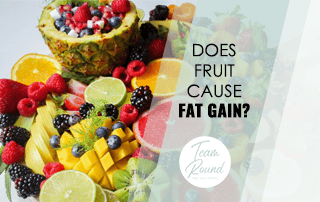
Does Fruit Cause Fat Gain?
It’s all fun and games until someone tells you fruit makes you fat… 😦💔🍎
Interesting topic.
If you’ve ever sat down about to have a beat down with a bowl of fruit salad and some chum tells you “won’t all that sugar make you fat??” 🤔 …Usually, someone holding a can of Coke. 🙄
READ ON.
Fructose (a form of sugar) is in fruit YES, but fructose itself doesn’t directly = weight gain. Nor does fruit.
A lot of the studies done on the link between fructose consumption and weight gain or lifestyle diseases (CVD, T2D and NAFLD), use sugar-sweetened beverages with high fructose corn syrup OR in some cases, fructose from food. The two are not the same.
HOWEVER, Kimber L. Stanhope (PhD, RD) and her colleagues did do an interesting (humorous in my opinion) trial to compare the two. Where they got a group of test subjects to consume 25% of their recommended daily intake in calories from fruit (containing fructose).
Four out of 7 participants bought the fruit back and said they couldn’t do it, and the other 3 did it but said they wouldn’t be able to do it again because it hurt. 🥴
So that would be the first reason I would say you don’t have much to worry about when it comes to consuming fruit in regards to fat gain. It’s a hard task to consume enough fruit to match the amount of HFCS in sugar-sweetened beverages and foods such as ice cream, chocolate, biscuits, doughnuts, pastries, etc.
Not to mention all the vitamins and minerals you GAIN from consuming fruit, that aid with preventing weight gain and lifestyle diseases. Particularly fibre, which slows down the rate at which fructose is absorbed as nutrients, helping you feel fuller for longer and actually thus aiding as a tool for fat loss.
So what WOULD cause weight gain and how did fruit get caught up in the works?
In terms of weight gain, the BIGGEST variable that will cause someone to gain weight is CALORIES IN, with the lack of calories out. (Eating more and moving less). Regardless of whether those calories come from protein, fat or carbohydrates (sugars being a form of carbohydrate).
However, the most palatable foods in which you would typically see someone overconsuming and being at a higher risk of excess weight gain, contain high levels of HFCS, fructose, glucose and fats.
So YES, fruit contains fructose, yes overconsumption of HFCS (not fruit) has been linked to increased risk of lifestyle disease and excessive fat gain. BUT, consuming EXCESSIVE fruit REGULARLY will only lead you to caloric surplus… (and probably a tummy ache) …in which it’s the caloric surplus that is going to be the culprit for weight gain. Not fructose.
So that being said, some of the ONLY reasons you would need to avoid fruit/fructose are below:
- You’re allergic to fructose and even then it would depend on the level of severity. If it’s a minor allergy, you can even still consume SOME fruits, like berries as they have a lower fructose content than say an apple or pear.
- You already have Type 2 diabetes (T2D). It would be ideal for you to be monitoring your FRUIT AND FRUCTOSE consumption.
- You don’t like fruit. If you like it, it’s good. But if you don’t like fruit, well then simply don’t eat it.
Rest assured, unless you are Snow White, you have next to no reason to be avoiding fruit. 🍎
References:
- Stanhope KL, Havel PJ. Endocrine and metabolic effects of consuming beverages sweetened with fructose, glucose, sucrose, or high-fructose corn syrup. Am J Clin Nutr. 2008;88(6):1733S–1737S. doi:10.3945/ajcn.2008.25825D https://www.ncbi.nlm.nih.gov/pmc/articles/PMC3037017/
- Stanhope KL, Havel PJ. Fructose consumption: recent results and their potential implications. Ann N Y Acad Sci. 2010;1190:15–24. doi:10.1111/j.1749-6632.2009.05266.x https://www.ncbi.nlm.nih.gov/pmc/articles/PMC3075927/
Further Information:
- SNR #155: Kimber Stanhope, PhD – Effects of Sugar Consumption on Body Composition, Lipid Regulation and Insulin Sensitivity – Sigma Nutrition & Performance https://sigmanutrition.com/episode155/
Glossary:
CVD: Cardiovascular disease
HFCS: High fructose corn syrup
NAFLD: Non-alcohol fatty liver disease
PhD: Doctor of Philosophy
RD: Registered Dietitian
T2D: Type 2 Diabetes

